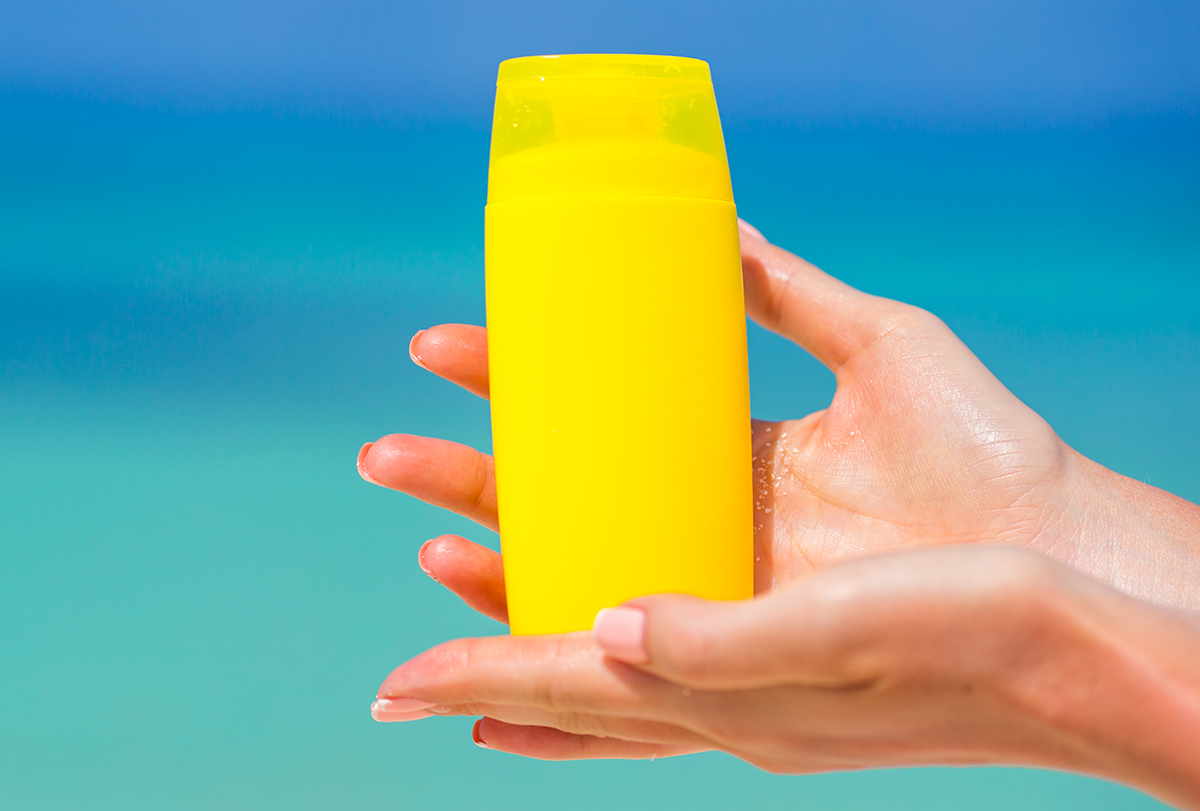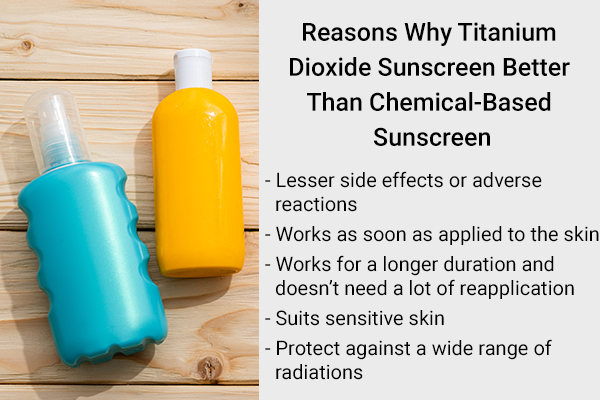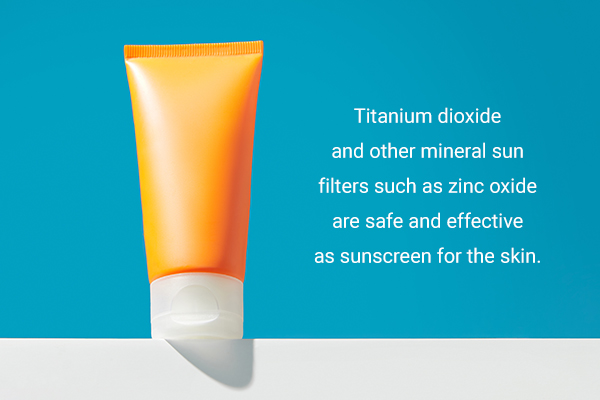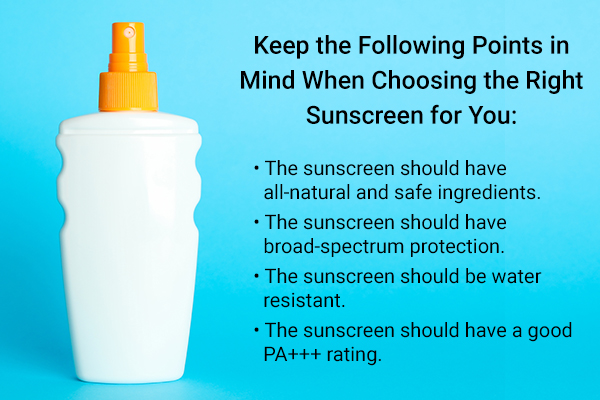In this article:
Titanium dioxide is a common ingredient found in sunscreens because of its high efficiency, low cost, and easy availability. (1)

You may wonder how it works to protect your skin from the sun’s rays.
What happens is that, upon sunscreen application, the titanium dioxide forms a protective coating on the surface of your skin. This coating functions like a mirror, reflecting and dispersing the sun’s UV rays away from your skin. (2)
In simple terms, titanium dioxide assists in preventing the UV rays from moving into your skin and causing problems such as sunburn and premature aging.
To learn how it functions in detail, how to use it properly, and what its probable side effects are, keep reading.
How Does Titanium Dioxide Safeguard the Skin from the Sun?
Sunscreens contain different types of ingredients that protect your skin from the sun’s UV radiation.
These ingredients function by filtering away the sun’s radiation through two different mechanisms: by forming a shield on the skin (mineral filters) or by absorbing the sun’s harmful rays (chemical filters). (2)
Titanium dioxide works in the following ways.
1. Creates a protective cover on the skin
Titanium dioxide creates a coating or shielding layer on your skin, which acts like a mirror as it disperses the UV rays away from your skin. (2)
So, if you are wearing a titanium dioxide-containing sunscreen, the UV radiation will not be able to reach your skin easily. Thus, you’ll be protected from these harmful UV rays.
2. Protects against a wide range of radiation
A notable thing about titanium dioxide that makes it great for use is that it is a broad-spectrum filter, meaning it will protect your skin from a wide range of radiation wavelengths – including both UVA and UVB. (3) It even protects the skin against blue light, which many sunscreens fail to do. (4)
Smaller-sized titanium dioxide particles also deliver protection against infrared (IR) radiation, and not only UV radiation. (5) This is a very new use of sunscreens and promises protection against different types of radiation kinds.
Also, titanium dioxide is very stable in the sun. (6) Therefore, it does not decompose and keeps protecting you against UV rays for extended hours.
Nanoform Titanium Dioxide Sunscreen Versus Normal Titanium Dioxide Sunscreen
Nano stands for small. So, nanoform titanium dioxide sunscreens refer to sunscreens that contain very small and tiny particles of titanium dioxide, unlike normal titanium dioxide, which has comparatively larger particles of titanium dioxide. (3)
Nanoform titanium dioxide sunscreen remains transparent on the skin, because of the small size of titanium dioxide, while other sunscreens usually leave a white creamy layer on the skin that people call white cast and do not like. (3)
Also, nanoform titanium dioxide makes the sunscreen very easy to use and spread, thus giving a very light feeling to the skin.
Hence, many people prefer using nanoform titanium dioxide sunscreen.
How Is Titanium Dioxide Sunscreen Better Than Chemical-Based Sunscreen?

There are many reasons mineral sunscreens such as titanium dioxide sunscreens are better than chemical sunscreens.
1. Lesser side effects or adverse reactions
Titanium dioxide sunscreens are mineral-based and do not usually contain harsh chemicals. Titanium dioxide-containing sunscreens, according to the Scientific Committee on Consumer Safety (SCCS), are nonirritant and nonsensitizing, making them safer for use.
They also do not pose any health hazard when used topically and are effective in protecting the skin against UV rays in concentrations of up to 25%. (7)
Chemical-based sunscreens, on the other hand, contain ingredients that may harm the skin and cause various side effects such as hormonal imbalance and neurotoxicity. (8)(9)
2. Work as soon as applied to the skin
Chemical sunscreens can require time before they start working after being applied to your skin. Experts claim that chemical sunscreens may take around 20 minutes after they are applied to the skin to start protecting the skin against UV rays.
Physical or mineral sunscreens such as titanium dioxide, on the other hand, start working as soon as they are put on the skin. So, you can step out immediately after applying them, whereas with chemical sunscreens, you’ll have to wait before going out in the sun.
3. Work for a longer duration and do not need a lot of reapplication
Mineral sunscreens such as titanium dioxide sunscreens last much longer than chemical-based ones. Sometimes, chemical sunscreens may decompose in the sun and thus require more reapplications or touch-ups.
Mineral sunscreens remain stable in the sun (6) and deliver much longer protection against sunlight.
4. Suit sensitive skin
Mineral sunscreens are gentler on the skin as they are less allergenic and sensitizing in comparison to chemical sunscreens. Hence, they are more suitable for those who have sensitive skin. (10)
Titanium dioxide is also noncomedogenic, which means it won’t clog pores, making it an even better choice for those who suffer from skin sensitivity.
5. Protect against a wide range of radiations
Titanium dioxide can protect your skin against UVA, UVB, IR, and visible radiations. Plus, it does not react with other ingredients in the sunscreen as it is inert. (11)
While there are some chemical sunscreens that can safeguard your skin against both UVA and UVB radiation, they may come with a lot of side effects.
Is Titanium Dioxide Safe for the Skin?

Yes, according to the FDA, titanium dioxide and other mineral sun filters such as zinc oxide are safe and effective as sunscreen for the skin. (12)
However, sunscreens may contain other ingredients that are not regarded as safe or require more research. These ingredients are (13):
- Octocrylene
- Dioxybenzone
- PABA
- Octinoxate
Side Effects Associated with Titanium Dioxide Sunscreens
While titanium dioxide sunscreens are regarded safe to use for most people, researchers have shared some rare but possible side effects, especially with the use of nanoform titanium dioxide sunscreens.
Nanoform titanium dioxide sunscreens can penetrate the skin, which can have a negative effect on cells such as autoimmune reactions. They may also cause the production of free radicals that can harm overall health.
However, other scientists argue that these side effects are very rare and the penetration of nanoparticles of Titanium dioxide into the skin is almost negligible and does not cause any harm.
In short, the benefits of titanium dioxide sunscreens outweigh the risks, making them safe for use. (11)
How to Use Titanium Dioxide Sunscreen Effectively?
Follow these steps to apply sunscreen properly:
- Take sunscreen out on the back of your hand and apply it generously to all areas with exposed skin, covering your face, neck, and even ears.
- Once the first coat has dried, add another thin coat to these regions.
- Keep reapplying sunscreen after every 2-3 hours.
Note: Make sure to apply sunscreen as the last step of your skin care regimen.
What Should You Look for in a Titanium Dioxide Sunscreen?

You will come across a lot of sunscreen options that contain titanium dioxide as their active ingredient. Keep the following points in mind when choosing the right sunscreen for you:
Most-Asked Questions
Does titanium dioxide block both UVA and UVB rays?
Yes, titanium dioxide provides protection against both UVA and UVB rays.
Can titanium dioxide cause skin irritation?
Titanium dioxide is considered to be nonirritating, but some individuals may experience mild irritation.
Can titanium dioxide be used on all skin types?
Yes, titanium dioxide is suitable for all skin types.
Is titanium dioxide photostable?
Titanium dioxide is a photostable.
Is titanium dioxide water resistant?
Titanium dioxide can provide some water resistance.
Final Word
Titanium dioxide is a physical sunscreen as it works by forming a barrier on your skin that keeps it protected from sun rays. It disperses any radiation that falls on the skin, thereby making sure you do not suffer from the harmful effects of the sun’s rays.
Titanium dioxide is safe for almost all skin types including sensitive skin.
- Was this article helpful?
- YES, THANKS!NOT REALLY


